Poythress, Vern S. “Correlations with Providence in Genesis 1,” WTJ 77 (2015): 71-99.
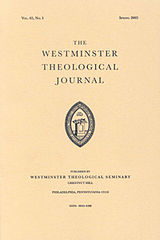 This article is the second in a recent trilogy of articles by Poythress on the opening chapters of Genesis. The heart of the article is a step through the creation week with particular attention given to correlations between God’s creation activity and normal providence. For instance, in normal providence heavy rains may cause water to cover dry land. Later the water recedes to show the dry land. This ordinary providence aligns with God’s causing the dry land to appear out of the water in creation. Or, God specially created the animals, but animals are “created” providentially though the normal processes of birth. I thought that Poythress sometimes showed real correlations between creation and providence, but other times I thought he was trying too hard. For instance, he sees a correlation between the original gift of food to eat in Genesis 1:29 and eating of plants today by humans. However, this is a stretch because God’s speech is looking beyond the creation week to the future. It’s not clear that something beyond ordinary providence was ever intended.
This article is the second in a recent trilogy of articles by Poythress on the opening chapters of Genesis. The heart of the article is a step through the creation week with particular attention given to correlations between God’s creation activity and normal providence. For instance, in normal providence heavy rains may cause water to cover dry land. Later the water recedes to show the dry land. This ordinary providence aligns with God’s causing the dry land to appear out of the water in creation. Or, God specially created the animals, but animals are “created” providentially though the normal processes of birth. I thought that Poythress sometimes showed real correlations between creation and providence, but other times I thought he was trying too hard. For instance, he sees a correlation between the original gift of food to eat in Genesis 1:29 and eating of plants today by humans. However, this is a stretch because God’s speech is looking beyond the creation week to the future. It’s not clear that something beyond ordinary providence was ever intended.
Poythress draws two conclusions from his observations regarding correlations between creation and providence. First, he looks at ANE creation myths and their similarities to the Genesis account. After noting that the differences between Genesis and the myths are far greater than the similarities, Poythress posits that many of the existing similarities developed as pagans shaped their creation myths from observations of a providentially ordered world—a providential ordering that God had correlated with the true creation. This is an intriguing thought, but it would have been nice of Poythress had worked through some specific examples.
In conjunction with this first conclusion, Poythress considers John Walton’s claim that the creation account is concerned with functional rather than material creation. Poythress notes that his emphasis on correlations with providence has a functional bent to it, but he denies that this means that material creation is excluded from the account. The material creation is necessary for there to be functions.
Second, Poythress concludes that the days of creation are functional days rather than a week of six normal days. He says that since God rested from creation on the seventh day, the day of God’s rest is everlasting. This seems to be to be an unwarranted assumption. God’s rest from creation may be everlasting, but it does not follow from this that the seventh day is everlasting. In addition, I’m not sure how to make sense of the claim that the days of the creation week are somehow “God’s days,” days that are only analogous to human days in normal providence. God is eternal and, as I understand eternity, there are no successive God-days for human days to be analogous to. Nor is there anything in the text of Genesis to indicate that the first week is different from succeeding weeks in human history. Just because some things in the creation week are analogous to ordinary providence (e.g., special creation of animals correlates to the birth of animals) does not mean that the water of Genesis 1 is only analogous to water in ordinary providence (as Poythress suggested of Genesis 1:2) or that the days of Genesis 1 are only analogous to ordinary days.
I found Poythress’s first conclusion intriguing but in need of further support. I found his second conclusion less than persuasive.

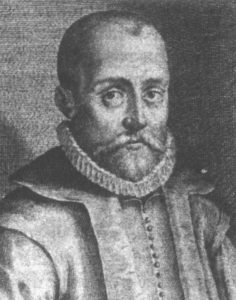
 Lloyd-Jones, D. M.
Lloyd-Jones, D. M. 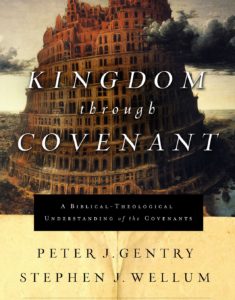 In this volume Wellum and Gentry embark on the ambitious project of laying out a third way between covenant theology and dispensationalism. They label their position New Covenant Theology or Progressive Covenantalism (others who hold a similar position are Tom Wells, Fred Zaspel, John Reisinger, Thomas Schreiner, and Jason Meyer). [Update 4/21/16: The authors wish to distinguish PC from NCT. The two share some similarities, but they do not wish them to be equated. Since Schreiner and Meyer both contribute to the new book on
In this volume Wellum and Gentry embark on the ambitious project of laying out a third way between covenant theology and dispensationalism. They label their position New Covenant Theology or Progressive Covenantalism (others who hold a similar position are Tom Wells, Fred Zaspel, John Reisinger, Thomas Schreiner, and Jason Meyer). [Update 4/21/16: The authors wish to distinguish PC from NCT. The two share some similarities, but they do not wish them to be equated. Since Schreiner and Meyer both contribute to the new book on 
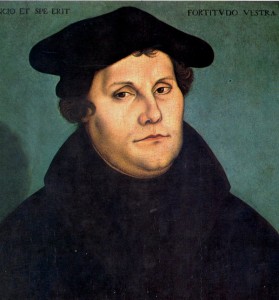
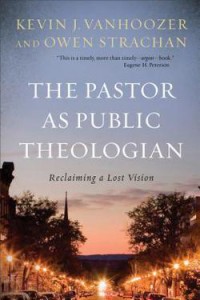 There are certain books whose effect largely depends on the time in life when you read them. For instance, I’d say that Frank Thielman’s Paul and the Law: A Contextual Approach was one of the most significant books that I read while in seminary. It was while reading that book that I understood for the first time the significance of the biblical covenants. I know that I had read about the covenants before, but their role in Scripture and my relation to them clicked for the first time while reading Thielman. That book may not have been as significant to my thinking had I already developed my thinking on the covenants and on the Mosaic Law. I have the sense that Vanhoozer and Strachan’s could have a similar effect on a seminarian or pastor—it could reshape the way they think about ministry. Others will already share their vision, making the book less significant to them.
There are certain books whose effect largely depends on the time in life when you read them. For instance, I’d say that Frank Thielman’s Paul and the Law: A Contextual Approach was one of the most significant books that I read while in seminary. It was while reading that book that I understood for the first time the significance of the biblical covenants. I know that I had read about the covenants before, but their role in Scripture and my relation to them clicked for the first time while reading Thielman. That book may not have been as significant to my thinking had I already developed my thinking on the covenants and on the Mosaic Law. I have the sense that Vanhoozer and Strachan’s could have a similar effect on a seminarian or pastor—it could reshape the way they think about ministry. Others will already share their vision, making the book less significant to them.